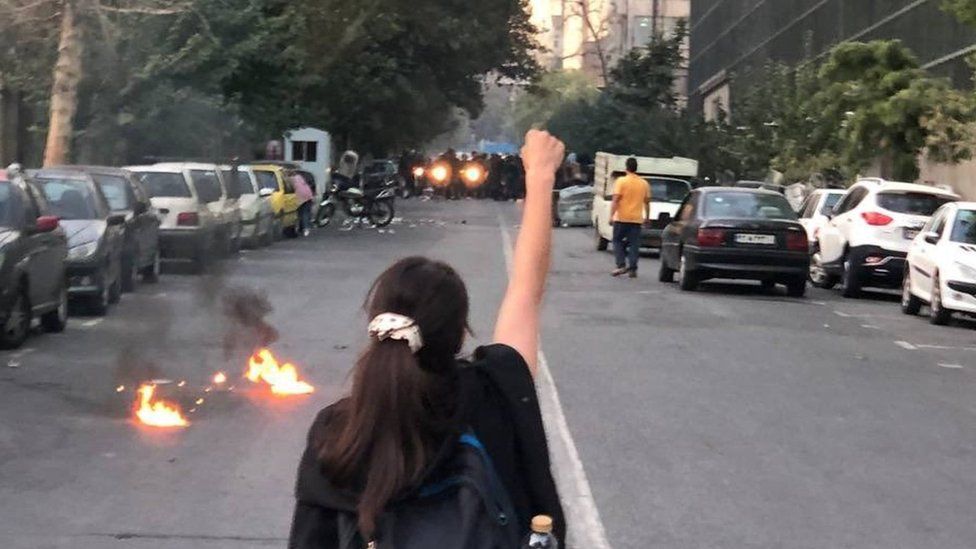IN THE MEDIA
Australia should assist the struggling women of Iran
November 8, 2022 | Tammy Reznik

An edited version of this article was published in the Daily Telegraph and the Courier Mail – 8 November 2022
More than six weeks after the Sept. 17 death of Mahsa Amini in the custody of Iran’s morality police, the unprecedented wave of protests sparked by her death continues. Once unthinkable scenes of widespread mass demonstrations led by Iranian women, burning their headscarves (hijabs) and cutting their hair, as they brandish the now famous slogan “Women, Life, Freedom” (Jin, Jiyan, Azadî ), have gone viral.
If anything, the protests have been gaining momentum. There has been footage of school age girls as young as 14, so emboldened that they too have joined the fight; ripping off their hijabs and shouting “get lost Basij” directly at a guest speaker from Iran’s Islamic Revolutionary Guard Corps paramilitary arm.
The regime has predictably responded with violence and murder in large numbers – at least 200 people have been killed, probably many more. Many of the victims have been young women. For instance, reports from a high school in Ardibil say security forces assaulted girls who refused to sing an anthem in praise of the Ayatollah, killing 16-year-old Asra Panahi.
While Amini’s death was the spark that lit the flame, the disquiet has been bubbling for some time, amidst a worsening crackdown on Iranian women’s rights under the new, corruptly-elected hardline President Ebrahim Raisi. Meanwhile, the population had already been suffering a dire economic situation, high unemployment, inflation and rampant corruption.
Women around the world, including in Australia, have united in solidarity with Iranian women, staging mass protests, using the hashtag #Mahsa Amini. These efforts, whilst powerful and commendable, are not substantive enough to put the necessary pressure on the Iranian government.
Numerous governments have tried to help, imposing new sanctions on those parts of the regime responsible for the repression and murder of demonstrators – it is time that Australia does the same.
The regime’s crackdown on women’s rights started during this year’s annual “National Day of Hijab and Chastity” (July 12), when the clerical-dominated state launched an even harsher than usual campaign for the imposition of the Islamic dress code on women.
Raisi said he was angered by what he called “a lack of compliance with hijab rules” and the organised promotion of (moral) corruption in Islamic society. This, he said, is the result of collusion and “world arrogance” (regime code for the US).
The regime stepped up enforcement by the Guidance Patrols, the nation’s “morality police”, encouraging Iranian bystanders to turn women into the authorities if their hijab appeared not to comply. It has also promised to employ surveillance technology, including facial recognition, to identify and track down women who are breaching the strict new hijab laws.
The intensity of Raisi’s obsession with modesty has filtered into things such as banning from women, even modestly dressed ones, from all advertisements, and images of deceased women on gravestones being monitored for modesty.
According to famous New York-based Iranian dissident feminist Masih Alinejad, whom the regime has twice tried to kidnap or kill, “The hijab is the tool the regime uses to control the women and, through them, Iranian society.” She likens the hijab rules to the Berlin Wall, saying, “If we bring it down, the entire system will collapse.”
On. Sept. 26, Canada added new measures to its existing sanctions against Iran; listing 25 individuals and 9 entities, including officials in Iran’s Islamic Revolutionary Guard. PM Justin Trudeau promised the “women who are protesting in Iran and those who support them” that Canadians “are with you”.
The US has sanctioned the morality police, Islamic Revolutionary Guard Corps (IRGC) commanders, and numerous Iranian prison officials. The US Administration is also campaigning to have Iran thrown off the UN Commission on the Status of Women.
The UK imposed similar sanctions in early October, then so did the EU, with European Commission chief Ursula von der Leyen saying of Iran’s crackdown, “This shocking violence cannot stay unanswered”.
There are also international efforts to bar Iran from competing at the upcoming FIFA soccer World Cup in Qatar
But where is Australia?
In Canberra, there have been verbal expressions of concern about the plight of Iranian women by the Government, Opposition and various other MPs, but there has yet to be any serious discussion of the sort of targeted sanctions our allies are imposing.
On Nov 2, a joint statement was released by Canada, Australia and New Zealand saying, “There must be accountability for the ongoing, systemic repression of women and girls in Iran”. Yet the time for such lip service has passed, and countries like our own must now use a language that the regime will pay attention to – that of sanctions.
Surely, Australia should now also take stock of its priorities, and more actively assist global efforts to help Iran’s women in their fight to enjoy the same freedoms Australians take for granted.





